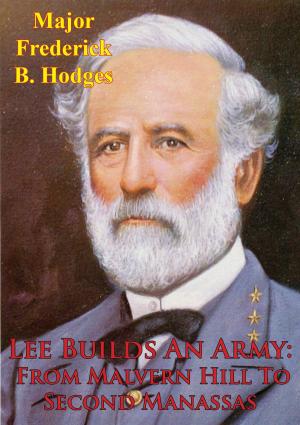Stonewall Jackson At Chancellorsville: The Principles Of War And The Horns Of A Dilemma At The Burton Farm
Nonfiction, History, Modern, 19th Century, Americas, United States, Civil War Period (1850-1877), Military| Author: | Major Jeremiah D. Canty | ISBN: | 9781786252999 |
| Publisher: | Golden Springs Publishing | Publication: | November 6, 2015 |
| Imprint: | Golden Springs Publishing | Language: | English |
| Author: | Major Jeremiah D. Canty |
| ISBN: | 9781786252999 |
| Publisher: | Golden Springs Publishing |
| Publication: | November 6, 2015 |
| Imprint: | Golden Springs Publishing |
| Language: | English |
The Battle of Chancellorsville in May 1863 and particularly the Flank March and Attack under Jackson served as a metaphor for the operational victories the South gained while at the same time signifying why the South could not hope to win strategically based on a policy of accepting greater levels of risk than its Northern opponent.
In the spring of 1863 the Federal cause had just recovered from the disasters of the previous year with a resurgent army and leadership...General Hooker headed south to try his hand against the nemeses of the North; General Lee and General Jackson. Initially, Hooker was very successful and essentially “turned” Lee’s position at Fredericksburg...Lee, facing defeat in detail as he attempted to hold off two possible Federal thrusts, was galvanized into action that seemed to defy the military principles of the day. Dividing his already heavily outnumbered army Lee attacked the eastern most elements of Hooker’s army that was south of the river. The unexpected thrust unnerved Hooker who withdrew back into the Wilderness to fall back on defensive positions in anticipation of further Confederate attacks. Lee and Jackson realized they had no choice but to attack the Federals and decided on yet another division of the army, in further defiance the principles of war. Even though Hooker correctly appreciated Lee’s intent he failed to take adequate precautions against a Confederate move from the west. In spite of being observed on several occasions the Second Corps of “Stonewall” Jackson arrived on the flank of the Federal army and delivered one of the most crushing blows of the war. Lee and Jackson’s ability to absorb levels of risk that were not feasible for Hooker to accept gave them a distinct advantage over the Federal commander and thus acted as a significant force multiplier.
The Battle of Chancellorsville in May 1863 and particularly the Flank March and Attack under Jackson served as a metaphor for the operational victories the South gained while at the same time signifying why the South could not hope to win strategically based on a policy of accepting greater levels of risk than its Northern opponent.
In the spring of 1863 the Federal cause had just recovered from the disasters of the previous year with a resurgent army and leadership...General Hooker headed south to try his hand against the nemeses of the North; General Lee and General Jackson. Initially, Hooker was very successful and essentially “turned” Lee’s position at Fredericksburg...Lee, facing defeat in detail as he attempted to hold off two possible Federal thrusts, was galvanized into action that seemed to defy the military principles of the day. Dividing his already heavily outnumbered army Lee attacked the eastern most elements of Hooker’s army that was south of the river. The unexpected thrust unnerved Hooker who withdrew back into the Wilderness to fall back on defensive positions in anticipation of further Confederate attacks. Lee and Jackson realized they had no choice but to attack the Federals and decided on yet another division of the army, in further defiance the principles of war. Even though Hooker correctly appreciated Lee’s intent he failed to take adequate precautions against a Confederate move from the west. In spite of being observed on several occasions the Second Corps of “Stonewall” Jackson arrived on the flank of the Federal army and delivered one of the most crushing blows of the war. Lee and Jackson’s ability to absorb levels of risk that were not feasible for Hooker to accept gave them a distinct advantage over the Federal commander and thus acted as a significant force multiplier.



![Cover of the book The Civil War In The Western Theater 1862 [Illustrated Edition] by Major Jeremiah D. Canty](https://www.kuoky.com/images/2015/november/300x300/9781786254337-ymNQ_300x.jpg)
![Cover of the book Second Manassas: An Operational Dynamics Perspective. [Illustrated Edition] by Major Jeremiah D. Canty](https://www.kuoky.com/images/2014/august/300x300/9781782894209-xHCg_300x.jpg)










